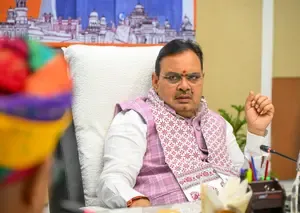Rajasthan Government Approves 'Coaching Centers (Control and Regulation) Bill-2025'

Synopsis
Key Takeaways
- Approval of the Rajasthan Coaching Centers Bill-2025 for better regulation.
- Mandatory registration for coaching institutes with 50 or more students.
- Establishment of a 24/7 helpline for student support.
- Introduction of a State Skill Policy for youth training.
- Equal Opportunity Policy for Divyangjans in government sectors.
Jaipur, March 8 (NationPress) A cabinet meeting led by Chief Minister Bhajan Lal Sharma took place at the Chief Minister's Office on Saturday. Several crucial decisions were made concerning Divyangjan welfare, employee welfare, governance reforms in municipal improvement trusts and development authorities, and strides in renewable energy.
Post-meeting, Deputy Chief Minister Premchand Bairwa and Parliamentary Affairs Minister Jogaram Patel declared a significant move towards regulating coaching centres throughout Rajasthan.
The cabinet approved a proposal to introduce the Rajasthan Coaching Centers (Control and Regulation) Bill-2025, aimed at ensuring enhanced oversight, student safety, and transparency within the coaching sector. This bill has been crafted in accordance with the guidelines established by the Central government, considering Rajasthan's unique context and stakeholder consultations.
To boost transparency, a state-level portal and a 24/7 helpline will be launched to offer counselling and support for students. Premchand Bairwa mentioned that once the bill is enacted, all coaching institutes will be required to undergo mandatory registration.
Coaching centres with 50 or more students will come under the legal framework, ensuring a safe, disciplined, and conducive learning atmosphere. To ensure compliance, the Rajasthan Coaching Institutes (Control and Regulation) Authority will be formed under the chairmanship of the Secretary of the Higher Education Department.
Furthermore, district-level committees, led by District Magistrates, will be established to monitor coaching centers locally. Minister Jogaram Patel emphasized the approval of the State Skill Policy, designed to equip Rajasthan’s youth with specialized skills matching industry demands.
This policy will significantly contribute to industrial growth and prepare young professionals for global job markets. The state cabinet also resolved to modernize ITIs.
As part of this initiative, ITI institutions will be transformed into advanced skill centres, incorporating modern courses, industry-relevant modules, and practical training. Model career centres will be established in divisional headquarters, providing guidance on skill training, career counselling, internships, and job placements.
To meet contemporary industry requirements, the youth will receive specialized training in cutting-edge fields, including Automation, Artificial Intelligence (AI), Machine Learning, Internet of Things (IoT), Smart Manufacturing, and Cybersecurity. Skill training centres will be set up near major industrial clusters, and a Recruit, Train, Deploy model will be initiated to close the skill gap based on industry-specific needs. The policy also prioritizes re-skilling and up-skilling initiatives for experienced workers, ensuring they remain competitive in the changing job market.
Additionally, the cabinet approved the Equal Opportunity Policy in line with the Rights of Persons with Disabilities Act, 2016. This policy will be executed across all government departments, offices, and institutions under the state’s jurisdiction.
Key Features of the Policy encompass ensuring barrier-free access for Divyangjans in government buildings and offices, all physical and digital infrastructure in state institutions will comply with accessibility standards set by the Union government, provisions for post-recruitment and pre-promotion training for specially-abled employees, exemption of Divyangjan employees from rotational transfers whenever possible, and consideration of preferred postings for Divyangjan employees during transfers or promotions.









